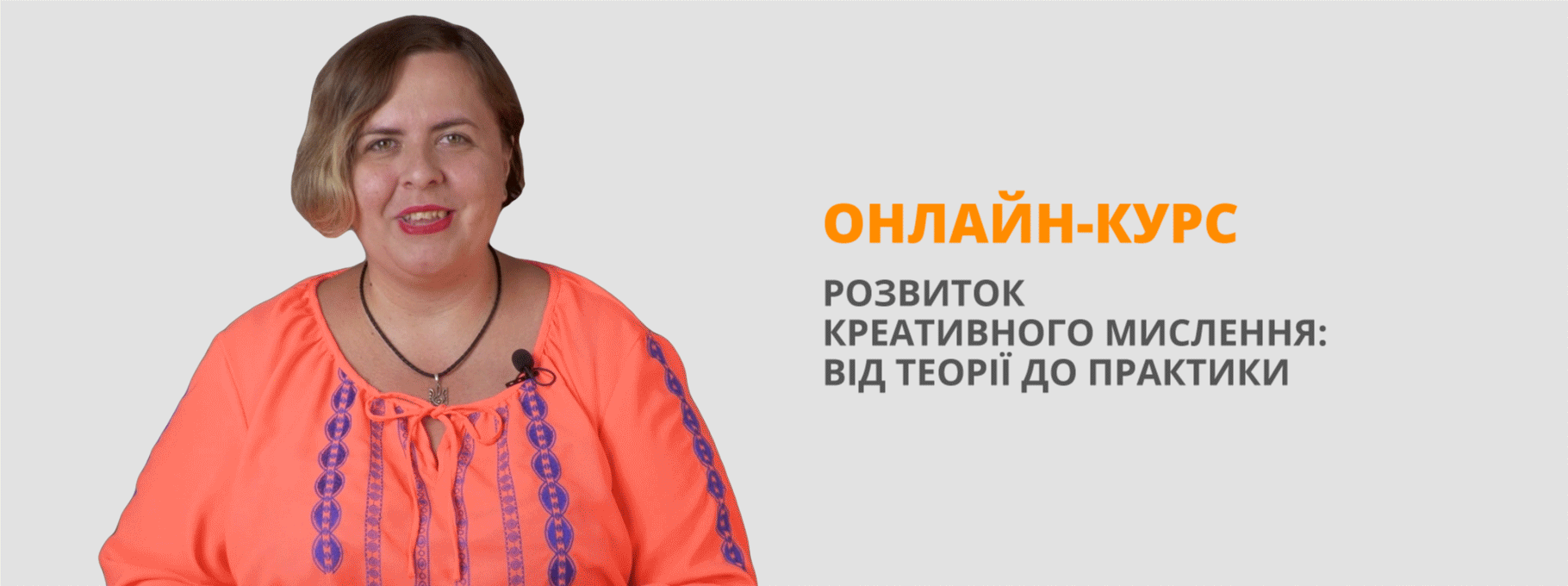Урок для 10 класу "Видо-часові форми дієслів"
План-конспект залікового уроку з англійської мови за темою:
«Видо-часові форми дієслів»
Урок № 12 Дата 08.10.2021 Клас 10-Б
Тема: Видо-часові форми дієслів.
Сфера спілкування: освітня.
Тематика ситуативного спілкування: робота і професії.
Мовний інвентар: grammar: Past Simple, Present Perfect, Present Perfect Continuous.
Мета уроку (як намір учителя):
- розвивати в учнів граматичну компетенцію;
- повторити форми дієслів у простому минулому та теперішньому доконаному часах;
- вчити учнів утворювати стверджувальні, заперечні та питальні речення в теперішньому доконано-тривалому часі;
- вчити учнів уживати форми теперішнього доконано-тривалого часу дієслів в усному та писемному мовленні;
- формувати вміння та навички читання, письма й діалогічного мовлення;
- удосконалювати навички роботи в парах.
Очікуваний результат:
- володіє граматичною компетенцією;
- знає форми дієслів у простому минулому та теперішньому доконаному часах;
- вміє утворювати стверджувальні, заперечні та питальні речення в теперішньому доконано-тривалому часі;
- вміє вживати форми теперішнього доконано-тривалого часу дієслів в усному та писемному мовленні;
- володіє вміннями та навичками читання, письма й діалогічного мовлення;
- володіє навичками роботи в парах.
Методи: інтерактивні (парна робота (рольова гра), «мікрофон»), практичний (виконання вправ), словесний (пояснення вчителя, робота з підручником, бесіда).
Тип уроку: урок розвитку граматичної компетенції.
Обладнання уроку: підручник, дошка, роздатковий матеріал.
Схематичний план уроку
І. Початок уроку. Організація класу.
1. Привітання. Повідомлення теми та мети уроку (2 хв.).
2. Мовленнєва зарядка (2 хв.).
ІІ. Основна частина уроку.
1. Повторення граматичного матеріалу (6 хв.).
2. Вивчення правил вживання Present Perfect Continuous (7 хв).
3. Виконання вправ (7 хв.).
4. Читання (5 хв.).
5. Письмо (5 хв.).
6. Робота в парах (7 хв.).
ІІІ. Заключна частина уроку.
1. Підбиття підсумків уроку. Рефлексія (2 хв.).
2. Оцінювання навчальної діяльності учнів (1 хв.).
2. Пояснення домашнього завдання (1 хв.).
Хід уроку
І. Початок уроку / Introduction.
1. Привітання / Greeting.
Повідомлення теми та мети уроку / Theme and aim of the lesson.
T.: - Good morning, children. Take your seats, please. I am glad to see you. What date is it today? Who is on duty today? Who is absent today? Today we are going to revise Past Simple and Present Perfect Tenses and to learn how to form sentences in Present Perfect Continuous.
2. Мовленнєва зарядка / Warming up.
Talk
1. Is being a rock star or sports star a job?
2. Who has the best job in the world? Why do you think so?
ІІ. Основна частина уроку.
1. Повторення граматичного матеріалу / Revision of the grammar material.
T.: - Let’s remember cases when Past Simple, Present Perfect Simple are used. At first, open your textbooks on page 46 and do exercise 2 orally. Your task is to complete the sentences to make the rules.
|
Present Perfect, Past Simple, Present Perfect Continuous |
A We use the … to mention about the events in the past.
Example: I visited my aunt last weekend.
B We use the … to talk about the results and completed actions or events that are connected with the present.
Example: I’ve lived in this town for 6 years.
My brother has been to London.
Jane has already done her homework. Look!
C We use the … to talk about an action that began in the past and is still in progress or an action that has recently stopped and which explains the present situation.
Example: I’ve been working for this company since 2002.
David has been playing tennis so he’ s really tired.
T.: - Now look at the information and read it. (The teacher gives the students sheets of paper where there are different cases when we use Past Simple and Present Perfect.)
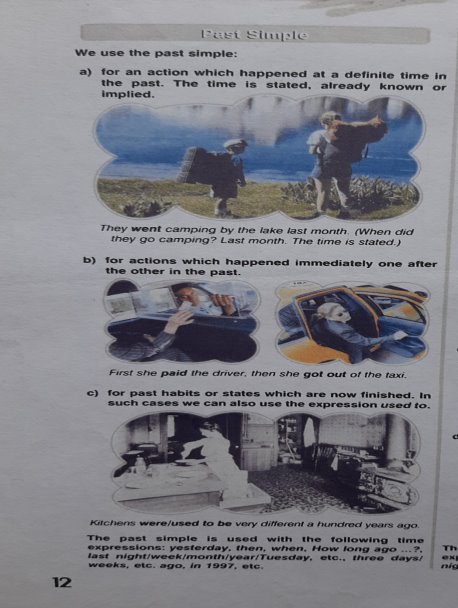
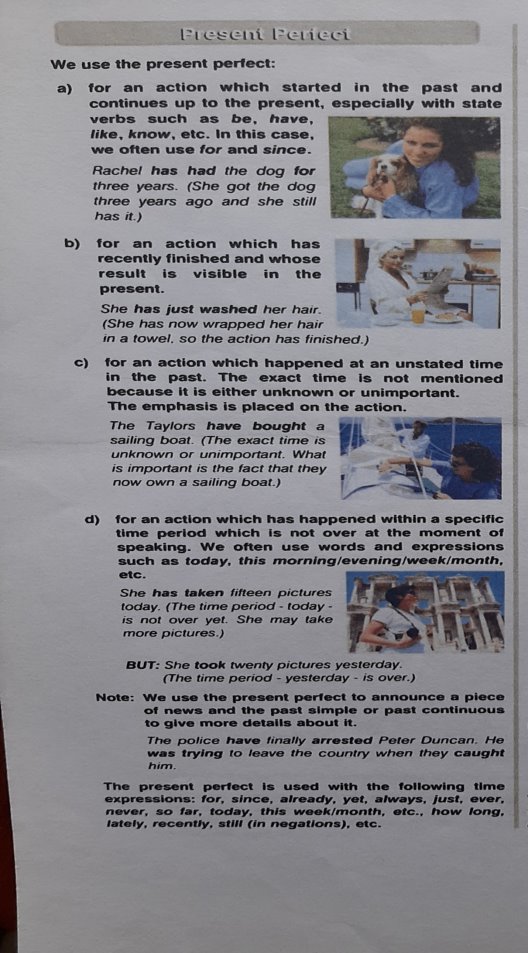
T.: - Let’s revise the formulas by which we form sentences in Past Simple and Present Perfect Simple Tenses.
(The teacher asks students to say the formulas and writes them on the blackboard. Then students give examples.)
Past Simple
+
Subject + V -ed / V2.
I / you / he / she / it / we / they played…
I / you / he / she / it / we / they won…
–
Subject + did not (didn’t) + verb (base form).
I / you / he / she / it / we / they didn’t play…
?
Did + S + verb (base form)?
Did I / you / he / she / it / we / they play… ?
Present Perfect Simple
+
Subject + have / has + V -ed / V3.
I / you / we / they have visited… He /she / it has visited…
I / you / we / they have done… He /she / it has done…
–
S + have / has + not + V -ed / V3.
I / you / we / they have not visited… He /she / it has not visited…
I / you / we / they have not done… He /she / it has not done…
?
Have / has + S + V -ed / V3?
Have I / you / we / they visited… ? Has he / she / it visited… ?
Have I / you / we / they done… ? Has he / she / it done… ?
T.: - Now do ex. 1 on p. 45. Your task is to complete the profile changing the form of the verb in brackets using the Past Simple or the Present Perfect.
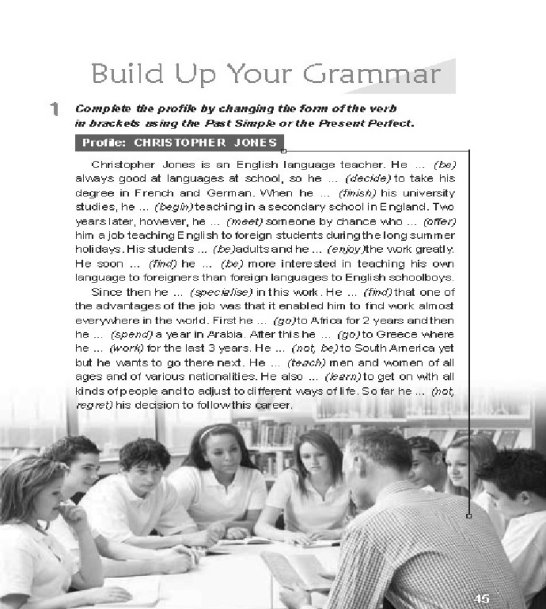
2. Вивчення правил вживання Present Perfect Continuous.
(The teacher dictates the theoretical material and writes examples on the blackboard, the students write them down in their exercise-books.)
Ми використовуємо Present Perfect Continuous (теперішній доконано-тривалий час):
а) щоб підкреслити тривалість дії, яка почалася в минулому та продовжується до теперішнього часу.
Sam has been talking on the phone for half an hour. (He began talking on the phone half an hour ago and he is still talking.)
б) для дії, що почалася в минулому та тривала деякий час. Дія може закінчитися або ще продовжуватися. Результат дії можна побачити в теперішньому.
Her feet hurt. She has been walking all morning. (The result of the action is visible in the present – her feet hurt.)
в) щоб виразити злість, роздратування.
Somebody has been giving away our plans. (The speaker is irritated).
Present Perfect Continuous використовують з такими часовими виразами: for, since, how long, lately, recently, all day / night / morning / my life / year (all day long, all night long…).
We have been watching the game SINCE 4 p. m.
Jack has been studying ALL AFTERNOON.
We have been working very hard RECENTLY.
Then the teacher gives the formulas which are used to form affirmative, negative, interrogative sentence in Present Perfect Continuous. The students write them down.
Present Perfect Continuous
+
Subject + have / has been + main verb with ending -ing.
I / you / we / they have been writing for an hour.
He / she / it has been writing for an hour.
–
S + have / has + not been (haven’t / hasn’t) + V -ing.
I / you / we / they have not been writing for an hour.
He / she / it has not been writing for an hour.
?
Have / has + S + been V -ing?
Have I / you / we / they writing for an hour?
Has he / she / it been writing for an hour?
T.: - Now turn over the page, please, and read about the differences between Present Perfect and Present Perfect Continuous.
We use the Present Perfect Continuous for incomplete actions which were in progress over a period of time in the past. With recently completed actions we use the Present Perfect.
We have been living in Kyiv for 12 years. (We’re still there now.).
They have lived in Luhansk, Donetsk and Dnipro. (They aren’t there now.)
We often use the Present Perfect Continuous with ‘how long’. If we ask ‘how often’ or ‘how much/many’ we use the Present Perfect.
How long has she been sleeping?
How often have you worn that suit?
How many English lessons have you had?
3. Виконання вправ / Doing exercises.
T.: - Do ex. 3 on p. 46. Your task is to read and make up sentences saying how long the people have been doing different things.
Example: Paula started laughing ten minutes ago and she is still laughing. (She / laugh)
She has been laughing for ten minutes.
1. The Carltons bought their car two years ago and they still have it. (They / drive)
2. Kitty’s brother jumped in the pool at 12. It’s now 1 p. m. and he’s still in the pool.
(He / swim)
3. Sheila came to work at 9. It’s now 5 p. m. and she’s still at work. (She / work)
4. We got our mixer in 2001. We still use it. (We / use)
5. Ben started telling jokes at 6 in the afternoon. It’s now 8 and he hasn’t stopped. (He / tell)
6. Mark and Will started playing a computer game at 4 p.m. It’s now 6 and they are still playing. (They / play)
7. I started drawing a picture in the morning and I am still doing it now, at 7 p.m.
(I / draw)
T.: - Now do ex. 4 on p. 47. Your task is to choose the correct word or phrase in brackets.
1. How long (have you had / have you been having) your car?
2. Ron (worked / has been working) as a postman for the past month.
3. Mary (has been finding / has found) a good job.
4. I have (written / have been writing) an essay all day.
5. How long (have you been living / do you live) in Kyiv?
4. Читання / Reading.
T.: - Match the phrases on the left with a possible suggestion of what has been happening.
|
Ron is very tired. |
He has been working very hard lately. |
|
Tom looks sunburnt.
|
He has been studying English for ten years. |
|
It hasn’t stopped raining. |
He’s been sitting in the sun for two hours. |
|
I’m still learning Japanese. |
I have been saving money for years. |
|
You’re out of breath. |
I’ve been learning since 2005. |
|
Tim’s English is good. |
We’ve been going there for years.
|
|
We travel to China every summer. |
I have been running. |
|
I have a million dollars. |
It’s been raining for two hours. |
5. Письмо / Writing.
T.: - Your task is to write answers using the words in brackets and prepositions since and for.
(There is a paper with the task on each desk. One student answer near the blackboard, others do it in their exercise-books.)
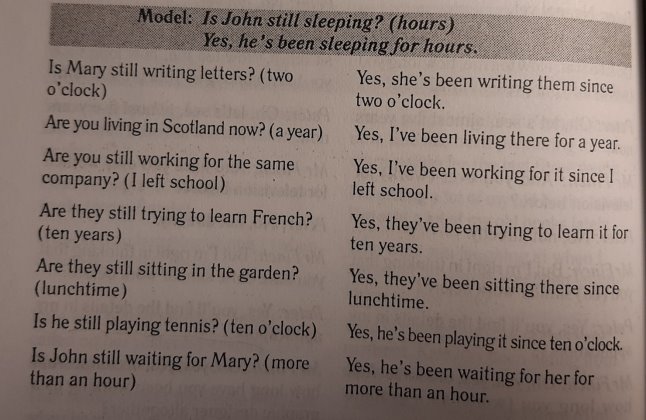 6. Робота в парах / Work in pairs.
6. Робота в парах / Work in pairs.
T.: - Role-play the situation.
It is Friday evening. One of you has decided to phone the other for a chat. Ask and answer questions about what you’ve been doing this week.
- Hi, there. I’m tired. I’ve had a terrible week!
- What have you been doing?
ІІІ. Заключна частина уроку.
1. Підбиття підсумків уроку / Summarizing.
Рефлексія /Reflection
An interactive exercise ‘a microphone’
- What did you practice at the lesson?
- Did you like the lesson?
2. Оцінювання навчальної діяльності учнів.
Your marks are…
3. Пояснення домашнього завдання / Explaining home assignment.
Your home assignment is to learn the theoretical material and to do ex. 5 (orally), 6 (in written) on p. 48.
The lesson is over. Good bye!


про публікацію авторської розробки
Додати розробку
